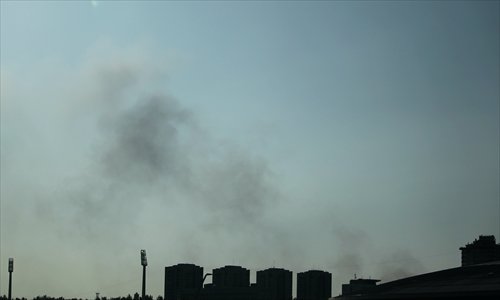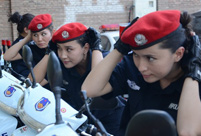 The 4th Chinese National Pole Dance Championship held in Tianjin
The 4th Chinese National Pole Dance Championship held in Tianjin
 Chinese navy commandos debut at 2014 RIMPAC
Chinese navy commandos debut at 2014 RIMPAC
 Guangxi impression: scenic countryside
Guangxi impression: scenic countryside
 World's largest aquatic insect found in Sichuan
World's largest aquatic insect found in Sichuan
 Ceremony volunteers for Youth Olympics make public appearance
Ceremony volunteers for Youth Olympics make public appearance
 A glimpse of female crew of Liaoning aircraft carrier
A glimpse of female crew of Liaoning aircraft carrier
 Stills from "Dad, where are we going?"
Stills from "Dad, where are we going?"
 Legless man's happy life
Legless man's happy life
 Top ten most beautiful islands in China
Top ten most beautiful islands in China
 Aerial view of Hong Kong
Aerial view of Hong Kong
 |
| Smoke blankets north Donetsk after shelling and antiaircraft fire on the outskirts of the eastern Ukrainian city on Saturday. (Photo: Cui Meng/GT) |
Graffiti, propaganda and free meals inside mysterious rebel building
Since protesters stormed in and occupied the regional government building in Ukraine's eastern city of Donetsk in early April, the site has become the headquarters of the self-proclaimed Donetsk People's Republic (DPR).
Throughout the planning of the trip to Donetsk, media colleagues in the capital Kiev and those returning from the rebel stronghold reminded us that obtaining media accreditation at the former Donetsk Regional State Administration building should be the first thing to do after setting foot in the city.
"It is a matter of life and death," said one French reporter we had met on the Donetsk streets. Therefore, we made it our first stop, which gave us a closer look at the "mysterious" headquarters.
Located in the city center, the 11-story building is guarded by nearly a dozen militants outside, with three stationed at the entrance to a square in front and the rest at the building's main entrance.
Each carrying an AK-47, some militants were dressed in neat camouflage fatigues with polished military boots, while others wore ill-fitting clay-colored uniforms with sneakers.
The militants standing just in front of the main entrance appeared vigilant, while those nearby were more relaxed. On the square in front of the building, flowers and candleholders were placed in front of a tablet bearing the pictures of five journalists killed in the conflicts. DPR flags flew on top of the headquarters. The glass on the front door was marked with the Russian for "no fascism."
Dozens of people stood in front, waiting to gain access. After 10 minutes, a staff member with the DPR's "Ministry of Information" met us at the entrance and instructed us to open our backpacks for a security check. The militants briefly examined each pocket of our backpacks without touching them.
Entering the lobby, a poster of a Malaysia Airlines Boeing-777, the same model as the downed MH17 in the Donetsk region on July 17, drew our attention. Flowers were laid in front of the poster to commemorate the 298 victims on board.
The downing of the flight sparked rounds of finger-pointing and increased tensions between rebels and the Ukrainian government.
Another wall displayed photos of deceased fighters, some of whom were killed in battle on July 3. The building seemed to be undergoing renovations. Workers carried building materials and moved a sofa into the elevator. Graffiti in English had been scrawled on a column near the elevator, reading "there is no place to go back."
We were led to the seventh floor, now occupied by the "Ministry of Information." Most of the offices seemed empty, and the corridor was turned into a waiting area for reporters.
Unlike a recent blog post by a Western journalist that complained about the lengthy process to obtain media accreditation, it only took us half an hour.
The office was packed with seven ministry employees and another poster of the MH17. Among them, four busily sorted through photos, edited video and browsed social networking sites - an important part of the current propaganda war with the Ukrainian government.
We were shown one of those videos - footage of a site that had been heavily shelled by Ukrainian government forces.
Before leaving the DPR headquarters, we were taken to the first floor canteen for a free meal, which included vegetable salad, a piece of bread, tea and salo, a traditional Eastern European food consisting of cured slabs of fatback.
We were told that all who come to the headquarters are entitled to a free meal, no certificate required. Asked where the money for the meals came from, our interpreter told us that it was donated by volunteers from both Ukraine and other nations, including Russia.
 Zhujiang ambassadors attend lotus lanterns activity
Zhujiang ambassadors attend lotus lanterns activity
 From girly girl to tough special police officer
From girly girl to tough special police officer
 Children attend gymnastics training in summer
Children attend gymnastics training in summer
 Beautiful sceneries along the special travel route in Xinjiang
Beautiful sceneries along the special travel route in Xinjiang
 Focus on 1st female patrol team in Turpan
Focus on 1st female patrol team in Turpan
 Collection of 'China Dream' public-spirited ads
Collection of 'China Dream' public-spirited ads  National fitness team members integrate traditional and modern beauty
National fitness team members integrate traditional and modern beauty Moms on their kid’s coming out
Moms on their kid’s coming out Chinese fighters through lens
Chinese fighters through lens
 48 hours after super Typhoon Rammasun
48 hours after super Typhoon Rammasun Bikini show held at water park in Xi'an
Bikini show held at water park in Xi'an
 Lobster vs cat: catch me if you can
Lobster vs cat: catch me if you can  Heat waves sweep China
Heat waves sweep China  Top 10 most beautiful islands in China
Top 10 most beautiful islands in China
 Zhou Xun announces engagement to Archie Gao
Zhou Xun announces engagement to Archie Gao
Day|Week|Month